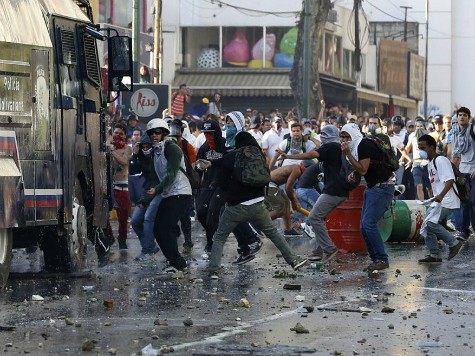A report claims that two individuals lobbed a Molotov cocktail into the headquarters of Venezuela’s ViVe TV this week. Government officials are already proclaiming the attack on the state-funded network the first blow in an allegedly impending wave of violence to commemorate the oppression of protesters and wave of political dissident arrests last year.
Venezuela Analysis reports that law enforcement place the attack on the television station as occurring around 3 AM, when few of the station’s employees would have been there. The Molotov did not enter the building–just shattered a window–so the damage was minimal.
The Venezuela Analysis report claims that Communications Minister Jacqueline Faria tweeted publicly in support of the station, “The fascist efforts to intimidate us will not succeed, we are motivated by our love for the continued strengthening of spaces for peoples’ media.” A cursory examination of what appears to be her Twitter account does not show any such tweet, however.
Nonetheless, the Venezuelan government appears to want to tie the incident to a greater warning that violence from their political opposition is imminent within the country. In an interview with state radio following the alleged attack, which occurred in western Zulia state, the governor of Táchira, José Vielma Mora, blamed “right-wing elements” for the attack and warned that others might follow.
“We will bring to public light proof that there are groups interested in fomenting disturbances in San Cristóbal, the capital of Táchira. We have information and are collecting our proof to prove it,” Vielma Mora asserted.
Táchira, on the border with Colombia, has long been the most rebellious of the Venezuelan states–and, as such, the one most subjected to state-sponsored violence. Daniel Ceballos, the opposition mayor of San Cristóbal, was arrested last March by secret police and remains in custody with no charges to his name. Days before, peaceful opposition protestors took down a statue of Hugo Chávez in the regional capital, after weeks of attacks from the nation’s National Bolivarian Guard. The violence against protesters, mostly unarmed students, reached such an alarming point that Vielma Mora, himself a Chavista, declared himself “not part of the regime” and called for an end to violence and the liberation of Leopoldo López, the leader of the opposition Popular Will Party. The anniversary of López’s arrest is February 18.
Amnesty International reports 40 official deaths in the months following López’s arrest, most unarmed students. 600 civilians–878 individuals total–were injured during protests. The Amnesty International report marking the anniversary of the protests notes that many female protesters arrested were threatened with sexual violence; protesters of both genders suffered unconscionable beatings. Two male Spanish nationals reported being beaten and raped with rifles while under police custody.
López’s wife, Lilian Tintori, is currently in Washington urging American government officials and civil rights leaders to intervene in his case and free him from prison. She joins a chorus of Venezuelan-Americans, most exiled in Miami, Florida, who are calling for a second round of sanctions to pressure the Venezuelan government into expanding the rights of its citizens.

COMMENTS
Please let us know if you're having issues with commenting.